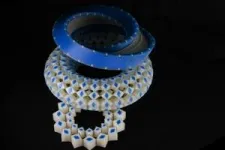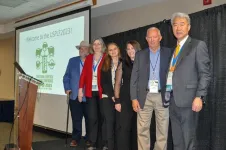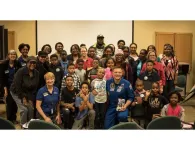(Press-News.org) Researchers from the UvA Institute of Physics and ENS de Lyon have discovered how to design materials that necessarily have a point or line where the material doesn’t deform under stress, and that even remember how they have been poked or squeezed in the past. These results could be used in robotics and mechanical computers, while similar design principles could be used in quantum computers.
The outcome is a breakthrough in the field of metamaterials: designer materials whose responses are determined by their structure rather than their chemical composition. To construct a metamaterial with mechanical memory, physicists Xiaofei Guo, Marcelo Guzmán, David Carpentier, Denis Bartolo and Corentin Coulais realised that its design needs to be ‘frustrated’, and that this frustration corresponds to a new type of order, which they call non-orientable order.
Physics with a twist
A simple example of a non-orientable object is a Möbius strip, made by taking a strip of material, adding half a twist to it and then gluing its ends together. You can try this at home with a strip of paper. Following the surface of a Möbius strip with your finger, you’ll find that when you get back to your starting point, your finger will be on the other side of the paper.
A Möbius strip is non-orientable because there is no way to label the two sides of the strip in a consistent manner; the twist makes the entire surface one and the same. This is in contrast to a simple cylinder (a strip without any twists whose ends are glued together), which has a distinct inner and outer surface.
Guo and her colleagues realised that this non-orientability strongly affects how an object or metamaterial responds to being pushed or squeezed. If you place a simple cylinder and a Möbius strip on a flat surface and press down on them from above, you’ll find that the sides of the cylinder will all bulge out (or in), while the sides of the Möbius strip cannot do the same. Instead, the non-orientability of the latter ensures that there is always a point along the strip where it does not deform under pressure.
Frustration is not always a bad thing
Excitingly, this behaviour extends far beyond Möbius strips. ‘We discovered that the behaviour of non-orientable objects such as Möbius strips allows us to describe any material that is globally frustrated. These materials naturally want to be ordered, but something in their structure forbids the order to span the whole system and forces the ordered pattern to vanish at one point or line in space. There is no way to get rid of that vanishing point without cutting the structure, so it has to be there no matter what,’ explains Coulais, who leads the Machine Materials Laboratory at the University of Amsterdam.
The research team designed and 3D-printed their own mechanical metamaterial structures which exhibit the same frustrated and non-orientable behaviour as Möbius strips. Their designs are based on rings of squares connected by hinges at their corners. When these rings are squeezed, neighbouring squares will rotate in opposite directions so that their edges move closer together. The opposite rotation of neighbours makes the system’s response analogous to the anti-ferromagnetic ordering that occurs in certain magnetic materials.
Rings composed of an odd number of squares are frustrated, because there is no way for all neighbouring squares to rotate in opposite directions. Squeezed odd-numbered rings therefore exhibit non-orientable order, in which the rotation angle at one point along the ring must go to zero.
Being a feature of the overall shape of the material makes this a robust topological property. By connecting multiple metarings together, it is even possible to emulate the mechanics of higher-dimensional topological structures such as the Klein bottle.
Mechanical memory
Having an enforced point or line of zero deformation is key to endowing materials with mechanical memory. Instead of squeezing a metamaterial ring from all sides, you can press the ring at distinct points. Doing so, the order in which you press different points determines where the zero deformation point or line ends up.
This is a form of storing information. It can even be used to execute certain types of logic gates, the basis of any computer algorithm. A simple metamaterial ring can thus function as a mechanical computer.
Beyond mechanics, the results of the study suggest that non-orientability could be a robust design principle for metamaterials that can effectively store information across scales, in fields as diverse as colloidal science, photonics, magnetism, and atomic physics. It could even be useful for new types of quantum computers.
Coulais concludes: ‘Next, we want to exploit the robustness of the vanishing deformations for robotics. We believe the vanishing deformations could be used to create robotic arms and wheels with predictable bending and locomotion mechanisms.’
END
Metamaterials with built-in frustration have mechanical memory
2023-06-14
ELSE PRESS RELEASES FROM THIS DATE:
Earth was created much faster than we thought. This makes the chance of finding other habitable planets in the Universe more likely
2023-06-14
When we walk around in our everyday life, we might not think of the Earth itself very often. But this planet is the foundation of our life. The air we breathe, the water we drink and the gravity that pins us to the ground.
Up until now, researchers believed that it took more than 100 million years for the Earth to form. And it was also common belief that water was delivered by lucky collisions with water-rich asteroids like comets.
However, a new study from the University of Copenhagen suggests that it might not have happened entirely by chance.
“We show that the Earth formed by the very ...
A scorching-hot exoplanet scrutinized by UdeM astronomers
2023-06-14
An international team led by Stefan Pelletier, a Ph.D. student at Université de Montréal's Trottier Institute for Research on Exoplanets announced today having made a detailed study of the extremely hot giant exoplanet WASP-76 b.
Using the MAROON-X instrument on the Gemini-North Telescope, the team was able to identify and measure the abundance of 11 chemical elements in the atmosphere of the planet.
Those include rock-forming elements whose abundances are not even known for giant planets in the Solar System such as Jupiter or Saturn. The team's study is published in ...
A growing number of producers and industries interested in precision livestock farming
2023-06-14
Some of the world’s best minds that are focused on profitable and sustainable livestock production attended and presented at the recent Second U.S. Precision Livestock Farming Conference. Hosted by University of Tennessee AgResearch, the May 21-24 event at the UT Conference Center in Knoxville attracted 219 attendees representing 22 countries and 32 U.S. states. Participants included academics, representatives of government agencies and allied industries as well as producers. The conference had a central theme of “Field Application of PLF Technologies” and academic presentations along with two industry and producer panels included interactive dialogues among the attendees ...
It takes a village: Study shows community is key to a sustained passion for science among adolescents
2023-06-14
The results of a yearlong science program show that one of the best ways to instill a lasting interest in science among children is to engage them alongside their family members. This finding runs counter to the current framework, in which children attend science-related summer camps and after-school programs apart from their families, diminishing the long-term potential of what they learn.
“We wanted to see if we could support families as a whole, as opposed to giving a student a really amazing one-off experience and sending them ...
Racial disparities found in one of first studies of pharmacological treatment of insomnia
2023-06-14
INDIANAPOLIS — In one of the first studies to investigate racial disparities in the pharmacologic treatment of insomnia, researchers from Regenstrief Institute and Indiana University report that patients belonging to racial minority groups were significantly less likely to be prescribed medication following diagnosis of insomnia than White patients.
The study found that Black patients were much less likely to have been prescribed an FDA-approved insomnia medication at any time post diagnosis than White patients. Other non-White individuals were significantly less likely to be prescribed an FDA-approved medication two, three, and four years after insomnia diagnosis ...
New York Academy of Sciences, Leon Levy Foundation name first 10 Leon Levy Scholars in Neuroscience
2023-06-14
New York, NY, June 14, 2023 — The New York Academy of Sciences and the Leon Levy Foundation announced today the first cohort of Leon Levy Scholars in Neuroscience; a continuation of an earlier fellowship program started by the Foundation in 2009 that has supported 160 fellows in neuroscience.
This highly regarded postdoctoral program supports exceptional young researchers across the five boroughs of New York City as they pursue innovative investigations in neuroscience and advance in their careers toward becoming independent principal investigators. Designed to broaden the field and to support researchers who might otherwise not ...
Cancer researchers focused on bringing new discoveries to patients get two-year funding awards
2023-06-14
June 14, 2023, TORONTO — Funding announced today by the Ontario Institute for Cancer Research (OICR) will help six Ontario-based research teams pursue their ultimate goal of improving the lives of people with cancer.
Funding comes through OICR’s Innovation to Implementation (I2I) program, which aims to help ensure new discoveries about preventing, diagnosing and treating cancer are adopted into healthcare policy and clinical practice.
“Every cancer researcher wants their work to have ...
Dr. Jonathan Weinsaft named chief of the Greenberg Division of Cardiology at Weill Cornell Medicine and NewYork-Presbyterian/Weill Cornell Medical Center
2023-06-14
NEW YORK (June 14, 2023)— Dr. Jonathan Weinsaft, an esteemed physician-scientist who focuses on clinical research and cardiovascular imaging, has been appointed chief of the Greenberg Division of Cardiology at Weill Cornell Medicine and NewYork-Presbyterian/Weill Cornell Medical Center, effective July 1.
The Greenberg Division of Cardiology, housed within the Weill Department of Medicine, is dedicated to diagnosing and treating patients with disorders of the heart and blood vessels that comprise the cardiovascular system.
In his new role, Dr. Weinsaft will further strengthen the division as a leader in scientific and technological ...
New diagnostic finds intact sperm in infertile men
2023-06-14
In a recent study, researchers created a diagnostic test to identify functional sperm in infertile men that could change the treatment of male infertility and assisted reproductive technology.
“Male infertility is a recognized issue and deserves scientific and clinical attention,” said Andrei Drabovich, an assistant professor of laboratory medicine and pathology at the University of Alberta and corresponding author of the Molecular & Cellular Proteomics study.
One in every six couples trying to conceive experience infertility issues. In fact, about 10% of men in the United States are infertile. The most ...
A novel technique to observe colloidal particle degradation in real time
2023-06-14
In the early 2000s, scientists from the UK made a worrisome discovery that the oceans are teeming with small particles of plastic (less than one millimeter in length) due to the continuous degradation of plastic waste. These microscopic particles of plastic have become a major environmental concern. Scientists classify these small particles as either microplastics or nanoplastics based on their size; the latter term is used exclusively for particles smaller than one micrometer.
These particles easily get embedded into the bodies of marine and freshwater animals, ...








